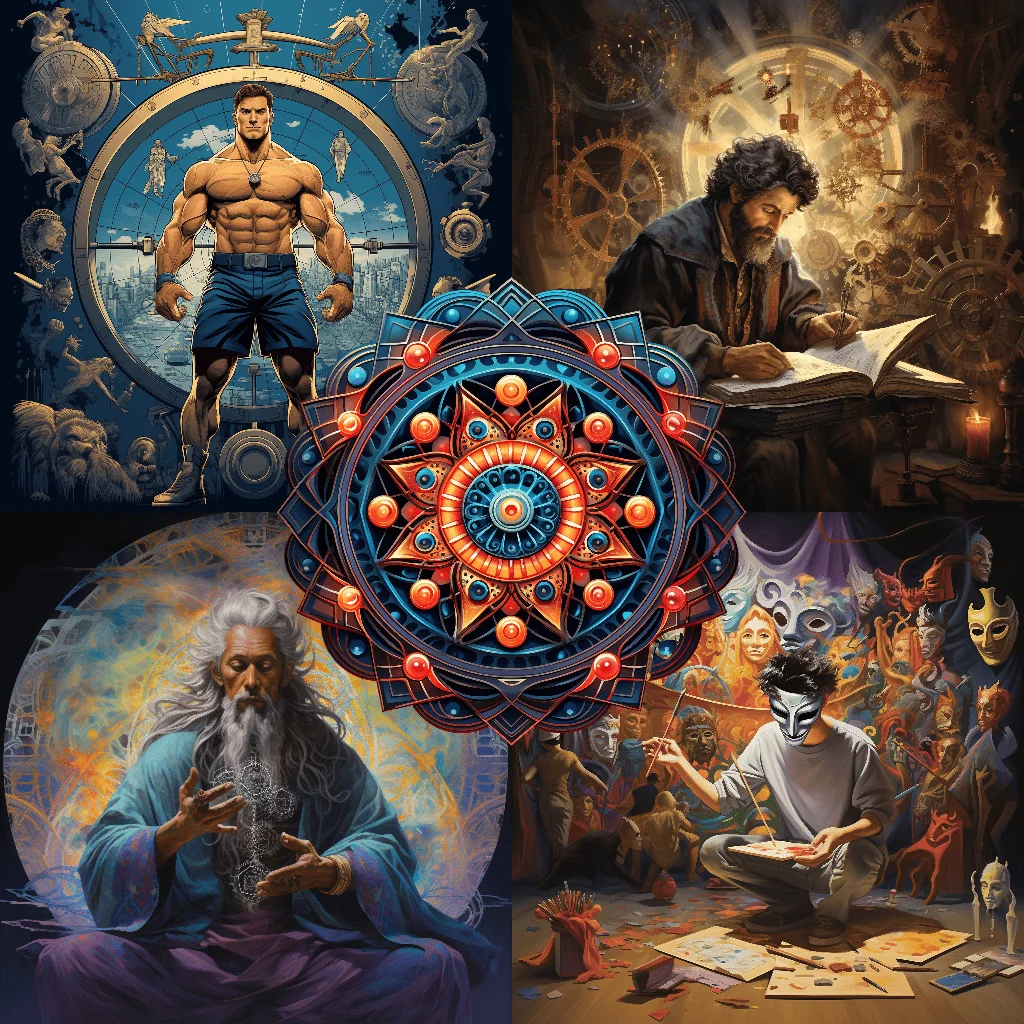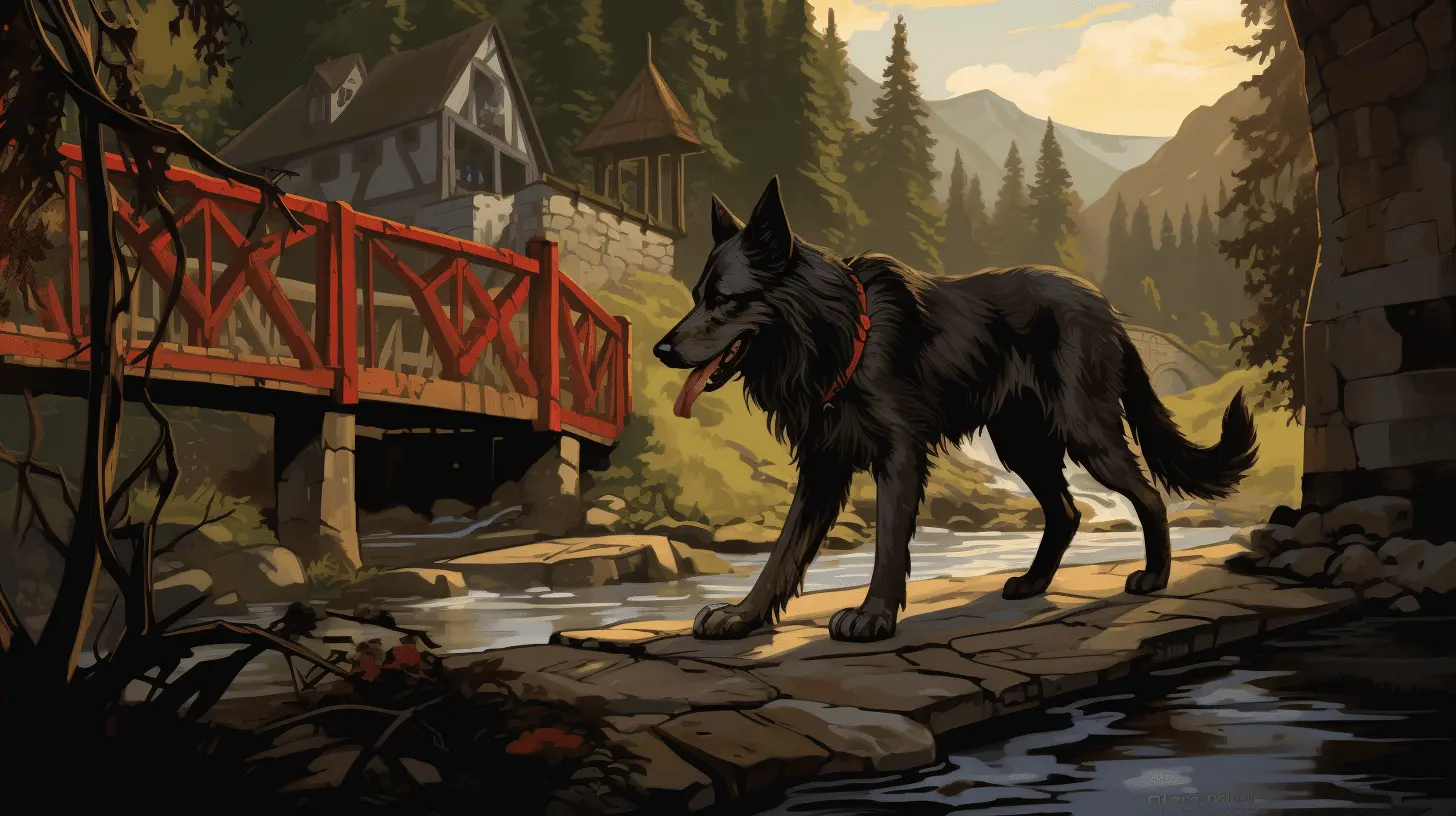

Introduction
Welcome to the Märchen Engine, your guide to the core rules of this Gaming System. This introduction gives you a snapshot of what the Märchen Engine entails and how it functions. As you delve into the subsequent chapters, you’ll learn how to craft characters and set out on thrilling adventures of your own.
What Is Roleplaying?
If you are new to roleplaying, you might be asking yourself, “What is a roleplaying game?”
In a roleplaying game (RPG) or table top role playing game (TTRPG), you step into the shoes of a character in a fictional world. You’re responsible for bringing this character to life, either through actual role-playing or through a series of structured decisions and character growth. The outcomes of your actions are determined by a set of formal rules and guidelines, like those found in the Märchen Engine.
When you play in a session of Märchen Engine, the game unfolds through conversation. One of you takes on the role of the Referee, who not only interprets the rules but also sets the stage for the game’s world. The rest of you each control a single character. Together with the Referee, you all weave a narrative. It’s akin to the imaginative games of make-believe you might have played as a child, but now with the added elements of dice and structure.
What Is the Märchen Engine?
The Märchen Engine serves as your guidebook for navigating games rooted in classic fiction and adventure tales. Within its pages, you’ll discover guidelines for crafting characters, tackling challenges, combating creatures, dabbling in speculative trading, venturing into unexplored realms, and much more. While no rulebook can cover every scenario, the Märchen Engine aims to equip you with enough tools to craft nearly any adventure you can imagine.
Drawing inspiration from the early days of roleplaying and classic fiction, the Märchen Engine shares many similarities with those vintage gaming systems. You’ll find that materials from older rule sets and those generated under the Märchen Engine can easily mesh together, requiring only minimal adjustments.
To get started, you’ll need a few essentials: a copy of the Märchen Engine rules, a set of dice—available at any game or hobby store (at a minimum, you’ll need four eight-sided dice)—and some pencil and paper for note-taking, map-drawing, and sketching. Above all, bring your imagination and a willingness to share your creative ideas with others. That’s the most important ingredient for a memorable gaming experience.
Iconography
⚅ - Dice Modifier - When you see this symbol, it’s telling you how to adjust your dice roll. For instance, ⚅-3 means you’ll subtract three from whatever you roll for that particular situation. On the flip side, ⚅+2 means you’ll add two to your roll. Don’t be fooled by the six-sided die image; it’s just a general indicator for a dice roll and doesn’t specify the type of die you should use.
Dice Symbols
σ – The lower-case Sigma symbol signals that you’ve rolled the dice and are now categorizing the outcome. Your result will fall within a range from -4 to +4.
± % – This symbol, plus or minus a percentage, comes into play after you’ve rolled the dice. You’ll categorize the result, which will be a percentage ranging from 400% down to 25%. Often, this modifies the time duration or profit of a transaction, depending on the skills you used to resolve the situation.
Time Symbols
🌍 - Annually. For you, this means something occurring or taking a year.
🌱 - Seasonal. You experience events or activities that last a season.
🌙 - Monthly / One Moon. In your life, things happen on a monthly basis or in sync with the lunar cycle, from full moon to full moon. A month is 4 weeks.
🔄 - Weekly. You find that some tasks or events occur every week. This is traditionally equivalent to a quarter of a month.
☀️ - Daily. In your culture, the day may start at sundown or sunrise. Regardless, some activities take a day to complete or occur daily.
⌚ - Watch of 4 hours. In your professional environments, the Watch is used to allocate work among teams. Some tasks may take a watch to finish, or they occur within each watch.
⏳ - This symbol represents an hour. Some tasks will take an hour, and some events happen hourly.
🔔 - This symbolizes 30 minutes. In various contexts, such as military or city life, bells ring on the hour and half-hour, helping communities coordinate tasks.
⏱ - A moment, which is 90 seconds or (¹/₄₀) of an hour, represents “now” or being in the moment for you and most people in general.
⚡ - The lightning bolt symbolizes a Once, a Round, or a Combat round, each lasting 7.5 seconds, historically defined as a twelfth (¹/₁₂) of a moment. This is as fast as people can conceive things happening.
👁️ - You can even break down Onces into “Atoms of time,” which are (¹/₄₇) of a Once. This measurement accounts for the time it takes for an eye to twinkle, hence the phrase “In the twinkling of an eye.” Some events can interrupt Once actions, and they all occur in Atom time, with no specific order but guided by what’s most awesome for the overall story, as decided by the Referee.
Skill Symbols
▩ = Skilled - Skilled. Contributes to Total.
☒ = Damaged - Skilled, but Damaged. Does not contribute to Total. Damaged skills can still be used to determine if an object is usable.
▣ = Competent - Experienced, but not skilled. Does not contribute to Total. Some objects require formal training to use successfully, competent skills can not be used to determine if an object is usable.
▢ = Unskilled - You have no Experience and you are not Skilled. Does not contribute to Total.
The Basic Assumptions
You and your fellow players are united in your quest for enjoyment, driven by a mutual goal to deepen your friendships and build stronger bonds with others. While this collective aim might not be explicitly stated, its influence is unmistakable. The core of your endeavors is rooted in kindness, integrity, and a communal spirit. The obstacles you face come in the forms of selfishness, discord, and arrogance. Each decision you make in support of these values is inherently noble, reinforcing the principles you hold dear.
Have Fun
In the realm of pen & paper roleplaying games, your primary aim is to experience joy and bring entertainment to your circle of friends. Keep in mind that tabletop RPGs are designed as a communal pastime, meant to be relished with your companions, and at the end of the day, it’s all in the spirit of play. Different circles might lean towards various styles—be it the thrill of strategic battles or the allure of personal narratives and storytelling—but the foundational ethos stays the same: relish the fun. When challenges crop up, a good number of them can be sorted out by applying simple logic and focusing on what makes these games so captivating. Consider this both from your vantage point as a participant and through the lens of the Referee. In the end, the objective is for everyone involved, yourself included, to have an exceptional time and fully immerse in the experience.
Fun for Players
As a participant in tabletop RPGs, you find joy in a variety of elements that collectively make the game enjoyable. Three major factors typically influence your level of satisfaction: the challenge difficulty, your character’s personal motivations, and the tangible effects of your actions on the game world.
The degree of challenge in overcoming obstacles can significantly contribute to your sense of achievement. Striking the right balance is key; too easy, and the challenges may seem inconsequential, but too hard can lead to frustration. If the Referee is uncertain, it’s generally better to err on the side of easier challenges to maintain the game’s flow and keep the story engaging.
Tying the main plot to your character’s backstory is vital for keeping you engaged. When the story’s goals, like rescuing a kidnapped person, are intertwined with elements of your character’s life—perhaps a dear family member or close friend—the stakes and emotional involvement elevate. The story’s outcome directly affects your character, deepening your connection and investment in the game world.
The consequences of your actions should be evident and meaningful within the game setting. For instance, a quest to vanquish a rampaging beast should have a well-thought-out aftermath, reflecting your success or failure. This could range from showing the devastation left by the creature to villagers celebrating your heroism. Seeing the real-world impact of your choices enhances your sense of agency and the story’s dynamism.
These are just a few crucial aspects to keep in mind as you navigate the world of tabletop RPGs.
Fun for Referees?
As a Referee, you find your enjoyment in various ways, each contributing to the overall satisfaction of running the game.
One of the most rewarding aspects for you is seeing the immediate reactions and feedback from your players, both during and after the session. Observing their expressions of excitement or apprehension serves as a fulfilling payoff for all the effort and planning you’ve put into the game.
Your creative process is another wellspring of joy. The act of designing the game, predicting player moves, and incorporating immersive elements like handouts, props, and music all contribute to your sense of creative fulfillment. When you finally unveil your carefully crafted session to the players, the anticipation heightens your own excitement. Acknowledgment and praise for your hard work are vital; they fuel your motivation to continue crafting compelling narratives. Your gaming experience actually begins well before the dice hit the table, during the preparation phase. Receiving positive feedback for this effort enables you to tailor future sessions in ways that are rewarding for both you and your players.
When Referees are having a hard time
As a Referee, you might encounter moments where preparing for sessions starts to feel more like a chore than a pleasure. When this happens, stepping back from the game or engaging with a new group can be refreshing. Broadening your horizons by interacting with other role-playing enthusiasts—perhaps through conventions or RPG-focused podcasts—can offer fresh perspectives and inspiration for future quests.
When the group’s enjoyment starts to wane, it’s essential to seek feedback from both players and fellow Referees. Your players can provide valuable insights into what’s affecting the fun factor, and their input can guide you in enhancing the gaming experience. Conversing with other Referees, whether in person or through online forums, can offer additional advice and support, helping you navigate challenges.
Handling players who put their own enjoyment above the group’s can be a delicate issue. It’s crucial to address this directly with the individual involved, even if it risks straining relationships. Open, honest conversations can often defuse tension and lead to a more enjoyable gaming experience for everyone.
Stay in Communication
To sidestep common pitfalls in gaming groups, effective communication is key for you. Don’t hold back from voicing concerns due to worries about confrontation or hurting feelings. Silence only allows frustrations to accumulate, potentially leading to heated, unintended clashes. Instead, tackle issues head-on and maturely. If there’s an aspect of the game you’re not enjoying, bring it up openly with your fellow players. Keep in mind that everyone may have different expectations, and these diverging views can make someone feel left out. The solution often lies in open dialogue.
Recognize that disagreements and constructive feedback don’t make anyone a bad person. Foster a communicative environment by offering positive reinforcement when someone’s actions improve your gaming experience. Don’t hesitate to share your ideas, pose questions, and express any concerns about where the game is headed. Since collaborative storytelling is the essence of role-playing, engaging in discussions about the story’s development with both your fellow players and the Referee is crucial.
Embrace Diversity
In the world of role-playing games, it’s essential for you to celebrate diversity and address any discrepancies in playstyles. If the game leans heavily towards combat and treasure hunting, but you’re more interested in deep role-playing and character arcs, don’t hesitate to talk to your fellow players. They might be willing to include more role-playing aspects if they know it’s something you’d enjoy. The Referee, too, may be focusing on a hack-and-slash style for simplicity but could easily pivot to more character-driven storytelling if that’s what the players want. Again, open communication is your best tool.
If you find that the group’s interests are firmly rooted in combat-centric gameplay, you’re faced with two choices: either adjust your expectations to enjoy the combat-focused sessions or think about exiting the game. It’s not fair to expect the group to shift their playstyle solely for your benefit. Loyalty to your friends shouldn’t compel you to stick with an activity that doesn’t make you happy. Exiting the game doesn’t mean you’re abandoning your friendships; there are plenty of other ways to spend quality time together. If your decision to leave causes tension within your circle, it might be time to reassess the dynamics of those friendships.
Value Others’ Time
Consistency is key in role-playing games, especially for storytelling, and this applies to you as well. When you’re late or can’t make it to a session, it creates hurdles for both the Referee and your fellow players. They’re left with the task of either accounting for your character’s absence or playing your role for you. If your character is pivotal to the storyline or the group is small, it might be best to delay the game until everyone can be present. Unless you have a compelling reason, make it a point to arrive on time. If you’re going to be late or can’t attend, inform the group as soon as you can so they can adjust their plans.
If you foresee regular tardiness or absences due to work or other obligations, it’s crucial to let the group know at the outset. Early communication allows them to strategize how to handle your character’s absence and enables the Referee to tailor the game to your availability. This ensures that any scenarios requiring your character’s specific skills or knowledge can be managed effectively.
Even if you have a busy schedule and important commitments, modern communication tools make it simple to stay in touch. There are few acceptable reasons for leaving your group in the dark about your whereabouts. Remember, your fellow players also have their own commitments and would rather not spend their time waiting on you.
Stay Engaged
In storytelling, protagonists rarely just go with the flow; they take charge, make plans, and confront challenges head-on. Your RPG character should embody this proactive spirit as well. Since RPGs aren’t scripted, your role goes beyond just ensuring your character does intriguing things. You also have the unique chance to influence the game world and narrative. This could mean introducing new characters, pursuing individual goals that diverge from the main storyline, or even aiding the Referee in world-building and scene-setting. Always be on the lookout for opportunities to enrich both your character and the game world. If an idea strikes you, speak up. The worst that can happen is the Referee saying “No,” but the best-case scenario could add a memorable twist to the adventure.
Share the Spotlight
While it’s important for you to play your character as a hero in an RPG, never forget that you’re part of a collaborative ensemble, not a solo act. Your character will undoubtedly have moments to shine, especially if you’re an active participant. However, there will also be times when other characters take the lead. It’s crucial for you to recognize when it’s your turn to step back and let others have their moment in the spotlight. In situations where your character is the focal point or when no one is specifically featured, be mindful not to hog the Referee’s attention. Instead, look for ways to involve other characters. Start in-character dialogues, formulate plans that leverage their unique abilities, offer comedic relief, or do anything else that allows your fellow players to be more than mere spectators to your monologues.
Keep the Game Flowing
While RPGs can hit snags for a variety of reasons—be it story complexities, rule ambiguities, or simple distractions—the Referee isn’t solely responsible for keeping things on track; you can help too. Remember, you’re there to engage in the game, so try to limit off-topic conversations and socializing that could derail the narrative. If you have anecdotes, jokes, or unrelated questions, share them at suitable moments and keep them brief to maintain the game’s flow. Stay involved even when your character isn’t the focus, so you don’t require constant catch-ups from your fellow players.
It’s beneficial for you to have a basic grasp of the game’s rules and setting, particularly as they relate to your character. While it’s okay to ask questions for clarification, make an effort to stay attentive and understand what’s happening. Consider making a cheat sheet or taking notes to help you remember key details. If you know you’ll need to refer to a rulebook, bookmark the relevant pages ahead of time.
If a scene starts to lag, especially if your character is central to it, take the initiative to move things along. Avoid getting bogged down in rule disputes during the game; instead, voice your concerns respectfully and abide by the Referee’s decision. Detailed discussions about rules can be saved for after the game. If everyone agrees on a better interpretation, it can be implemented in future sessions. Generally, the initial ruling won’t have a major impact, so it’s best to keep the game moving.
Be a Gracious Guest
One rule that’s sometimes forgotten but is crucial for you to remember is to be mindful of your host, whether you’re playing at someone’s house or a public venue like a local gaming store. If you want snacks or drinks during the game, it’s a good idea to bring your own. Your host is already offering the space for you to play; it’s not their responsibility to also provide refreshments. Before engaging in activities like smoking, vaping, or impromptu musical numbers, make sure everyone is comfortable with it.
Be especially considerate if there are others around who aren’t part of the game, such as family members of the host or customers and staff in a store. Keep your behavior polite and avoid actions that could be disruptive or annoying to them. And before you head out, take a few moments to clean up your gaming area. Dispose of any trash and aim to leave the space as clean—if not cleaner—than you found it.
The Core Task Resolution System
In the Märchen Engine, a core task resolution system is in place to determine the outcomes of your character’s actions. Whenever your character tries to do something where failure is a possibility, follow these steps:
-
Roll the dice, the type and number of which are dictated by your character’s attributes and the situation at hand.
-
Add any applicable modifiers to the roll. These could be related to your character’s skills, traits, the task’s difficulty, or specific circumstances.
-
Compare the final result to the success threshold. If your roll equals or surpasses this number, your action is successful. If it falls short, the action fails.
This straightforward system is the backbone for almost every action in the Märchen Engine. The specifics may vary based on the modifiers you add to your roll and the consequences of either succeeding or failing at the task.
Referee
In the Märchen Engine framework, one player is designated to take on the role of the Referee. This individual serves multiple functions: they are the organizer, the go-to authority for rule-related queries, the arbitrator of disputes, and the moderator for either a single Märchen Engine session or an ongoing campaign. Your role as the Referee is to knit together the narratives of the other players’ characters, manage all non-player elements of the game, craft settings where players can engage with each other, and resolve any conflicts that may arise among players.
Characters
In the Märchen Engine, there are two main categories of heroes: Player Characters (PCs) and Non-Player Characters (NPCs). A Player Character is a fictional figure within the Märchen Engine universe whose actions are directly steered by a human player, rather than being dictated by the game’s rules. On the other hand, Non-Player Characters are those not controlled by any of the players. The behavior and actions of these NPCs are usually managed by the Referee.
Player Characters
In the Märchen Engine, players craft a Hero that embodies the role they wish to play in the game, using the game’s rules as a framework. Typically, the Hero belongs to a specific race, which is determined by the options available within the Referee’s universe. Additionally, each Hero boasts a unique set of skills and varying levels of expertise in those skills. This customization allows players to create characters that are not only distinct but also aligned with their vision for their role in the game.
Associates, PCs, Heroes
In the context of the Märchen Engine, terms like Associates, PCs (Player Characters), and Heroes are used to describe other characters who are part of your adventure but are not controlled by the Referee. These characters are managed by other human players and accompany you on your journey, each contributing their unique skills and attributes to the collective quest.
The Company
Your group of characters comes together through shared interests or goals. These could be short-term objectives set by authority figures or a collective desire to explore the world for the first time.
After you and your fellow players have crafted your characters, discuss with the Referee the circumstances that united your group into a team of adventurers. The more detailed you are about the events that set you all on this path, the better. This gives the Referee valuable hooks for creating adventures that tie directly into your characters’ backgrounds.
The act of forming your team is the first activity you’ll engage in as a group. During this team-creation phase, the Referee assists you in defining the unique traits that characterize your band of adventurers.
Sanctuary
Sanctuaries serve as unique locations specifically designed to meet the needs of your team of adventurers, complete with a host who is willing to welcome you. At the start of the game, there’s only one location that you can already consider a sanctuary. As you progress through character creation and gameplay, you’ll encounter various characters who will unlock additional sanctuaries specifically for you and your fellow players.
Patron
A patron is typically a well-known or influential individual who occasionally provides your team with a reason to go on adventures, often offering support and advice as well. If you’re in the same location as a potential patron and they’re available, you and your companions can choose to meet with them during your seasonal activities.
Your team can have multiple patrons simultaneously, provided you meet the criteria to secure their loyalty. More often than not, patrons will expect something in return for their support and friendship.
First Meeting
The first step is to determine where your team of adventurers was formed. To do this, you and your fellow players pick a suitable location. Sanctuaries are often ideal choices, as they are known to be welcoming and are frequently connected to influential patrons. Once everyone agrees on a location, make sure to note its name on your individual character sheets.
Next, each player briefly introduces their character, highlighting how and why they ended up at the chosen location. Your characters’ cultural backgrounds and vocations can serve as useful starting points for this discussion. The Referee might use this time to offer additional context about the game world, especially for players who are less familiar with it. Some locations are particularly well-suited for your team’s initial gathering.
The objective for your first season is to hold this inaugural meeting. After that, you’ll either focus on tasks assigned by your patron—if your first meeting took place in a sanctuary—or journey to your first sanctuary to meet your patron.
Relationships
While all adventurers in your group share a sense of loyalty toward one another, each of you can form a unique bond with another member. This could be a deep respect for someone who is wiser or more noble, a special friendship with an old friend, a sense of kinship with someone from the same background, or a deep affection for a family member.
Whatever the nature of this relationship, you must choose another member of your team to be your character’s focus. Write down the name of this individual in the designated area on your character sheet. This focus can be any other Associate, Companion, or Patron within the group, even if someone else has already chosen them as their focus. Keep in mind that these bonds don’t have to be mutual. If another character chooses you as their focus, you’re still free to select anyone else as your own.
Rating
Your team of adventurers is more than just a random assembly of mercenaries united by circumstance. At the core of your group are shared objectives and a mutual respect for one another. This sense of unity is represented in the game through a communal pool of Company points. Throughout the game, you and your teammates can use these points to heal Mystical and Social Damage.
The initial number of Company points available to your group is equal to the total number of heroes in the team. Make sure to record this total in the designated area on your character sheet. This score will be updated each time a team member uses a point for recovery. It’s important to note that the pool of Company points is fully replenished at the start of each new game session.
Other Characters
As you progress through your adventures, you’ll find that your character forms both friendships and rivalries, establishing connections with various non-player characters who may become significant in future quests. These relationships fall into four distinct categories, each with its own implications and potential impacts on your journey.
Companion
A Companion is a character who joins you on your adventures but is not controlled by another human player. Instead, the Referee takes on the role of managing these Companions. Family members or spouses are common examples of Companions that many heroes are likely to have in their lives. These characters can add depth to your story and potentially play crucial roles in your adventures.
Allies
Allies are are individuals that you, as the Hero, know and have had friendly dealings with in the past. They possess valuable skills, positions, or assets and are willing to assist you, and will go out of their way to offer their support.
Contacts
Contacts are similar to Allies but are more inclined to actively assist you in your endeavors. They can offer various forms of support, from providing information to lending resources or skills that can help you on your quests.
It’s worth noting that both Allies and Contacts can also serve as Patrons, offering not just assistance but potentially guiding your adventures with specific tasks and objectives. These relationships add layers of complexity and opportunity to your journey.
Rivals
Rivals are individuals who harbor animosity or opposition toward you. They will actively seek to disrupt your plans, interfere with your objectives, or even harass you throughout your adventures. These characters add tension and challenges to your journey, serving as obstacles you must navigate or confront.
Enemies
Enemies are a step beyond Rivals in terms of hostility. While a Rival may operate within the bounds of the law to compete with or obstruct you, an Enemy has far more malicious intentions. They aim for your ultimate downfall, whether that means seeing you dead, imprisoned, or otherwise facing dire circumstances. These characters introduce high stakes and imminent threats to your adventure, requiring you to be ever vigilant and strategic.
Hirelings
Hirelings come in three main types, each serving a different role in your adventures:
-
Mercenaries: These are your standard hired soldiers, typically employed for conventional military tasks like guarding a location or attacking enemy strongholds. They usually work as part of a larger force.
-
Retainers: These NPCs are either brave or foolhardy enough to be paid for accompanying you on the perilous adventures that you love to undertake.
-
Specialists: These are experts in specific non-combat or combat-adjacent fields, such as tradesmen, armorers, or alchemists.
All hirelings come with basic equipment suitable for their profession, subject to the Referee’s discretion. For instance, a light infantryman might have leather armor, a shield, and a short sword or spear. An armorer or alchemist would come with their respective tools. You, as the employer, would be responsible for providing any heavy or specialized equipment, like a forge or laboratory.
To bring these NPCs into your service, you’ll need to negotiate terms with them. The Referee will usually handle this by role-playing the prospective hireling, using dice rolls to determine outcomes, or most likely, a combination of both role-play and dice.
Mercenaries
Mercenaries are individuals trained for combat, whether as formal soldiers or as hired muscle. Their tasks can range from guarding and patrolling to launching assaults on enemy strongholds or engaging in combat with opposing forces. They might even be employed to ambush unsuspecting travelers. However, don’t expect them to join you on high-risk, perilous adventures like plundering haunted tombs or infiltrating enemy castles for assassination missions. Those kinds of tasks are beyond what they’re willing to do for their usual pay. They’re soldiers, not daredevils.
Retainers
Retainers are NPCs who are willing to go the extra mile for you, serving as bodyguards, henchmen, or sidekicks. Unlike mercenaries, they’re loyal enough to follow you into dangerous situations and may operate individually rather than as part of a larger force. However, their loyalty comes at a cost: they require a higher monthly fee and expect a share of any treasure you acquire during your adventures.
You can have multiple retainers, but you must be able to afford them. The higher your Emotional strength and Leadership skills, the more retainers you can effectively manage. Regardless of your emotional strength, you’ll always be able to have at least one retainer.
The Referee will generate potential retainers as regular characters, using the standard character generation rules. This is always subject to the Referee’s discretion. Retainers come equipped with basic gear, either from their initial character generation or purchased with money they earned in their previous career.
Specialists
Specialists are tradesmen or professionals hired for specific non-combat tasks, like sailors to crew a ship or an alchemist to concoct potions. While they’re generally non-combatants, this can vary depending on the Referee’s discretion and the particular job they’ve been hired for. For instance, siege engineers are usually considered combatants, even though they’d expect to stay out of immediate danger.
The payment for a Specialist is determined by their specific skills and competencies. So, if you’re looking to hire someone with a unique set of skills, be prepared to negotiate a fee that reflects their expertise.




Comments
With an account on the Fediverse or Mastodon, you can respond to this post. Since Mastodon is decentralized, you can use your existing account hosted by another Mastodon server or compatible platform if you don't have an account on this one. Known non-private replies are displayed below.